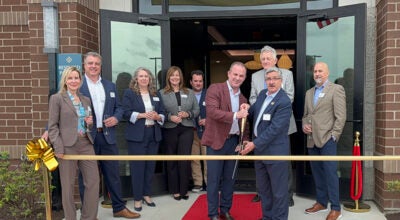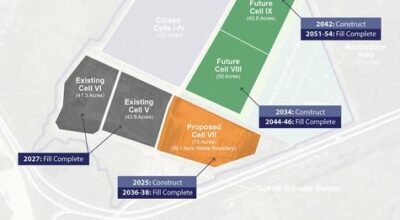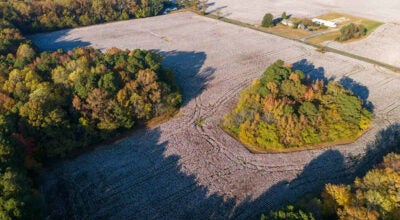Split council approves Holland solar project
Published 6:17 pm Friday, July 23, 2021
|
Getting your Trinity Audio player ready...
|
After considerable debate, a split City Council approved a 4-megawatt solar facility on 21 acres in the Holland area of the city near Virginia Tech’s Tidewater Agricultural Research and Extension Center.
Following a public hearing, council spent more than an hour discussing the proposal, and solar in general, before voting 5-3 to approve the conditional use permit for the project. Mayor Mike Duman, along with Councilmen Donald Goldberg, Roger Fawcett, LeOtis Williams and Vice Mayor Leroy Bennett, voted in favor of the project.
Council members Tim Johnson, Shelley Butler Barlow and Lue Ward voted against. Johnson and Barlow expressed concerns with the readiness of the city to accept solar farms and in putting them on agricultural land.
“We would be remiss, as a council, if we didn’t look at this and say, ‘Is this what we want our city to look like?’ And I’m telling you guys, this is just the beginning,” Johnson said. “We’ve got to address this because it’s going to keep on coming.”
As part of the project, Atlanta, Ga.-based Dimension Renewable Energy, which operates as Suffolk CSG LLC in the city, would build and operate a ground-mounted photovoltaic community solar facility, with electricity sold directly to residential customers in the city and the Dominion Energy utility territory, rather than to the utility itself.
The project will have about 10,875 solar modules that will be manufactured offsite and delivered to the site in wooden crates or cardboard boxes. Each module will be about 3.4 feet by 7.2 feet and rated at 480 watts. The modules will be configured into metal frames about two modules high and oriented to face south at a 25-degree tilt to maximize sun exposure.
It will be interconnected to a three-phase line owned by Dominion Energy along Holland Road. Dominion is currently performing a combined interconnection study to determine any needed upgrades for interconnection.
Plans call for a seven-foot-tall chain-link fence and a 50-foot wide vegetated screening buffer near the existing residential lots to the north, and a 15-foot vegetative landscape buffer to the east, west and south.
The project was proposed under the Shared Solar Program, approved by the General Assembly in 2020. The program is designed to serve people who cannot put solar on their roofs through an initial 200 megawatts of community solar projects within Dominion’s service territory, with at least 30% of customer use coming from those who live in low-income households.
Johnson, who said he had spoken to 18 farmers who were opposed to the project, said he has an issue with the solar farm being among the first things people see when they are driving east on Holland Road, also known as U.S. Route 58, coming into Suffolk.
“I think there’s other ways for (solar) to move forward than by taking our valuable farmland and turn it into solar,” Johnson said.
Butler Barlow said the city needs a better plan to address the influx of solar farm proposals coming to the city. She also took issue with the vague plans to decommission solar projects once they complete their life span, as none have as yet been decommissioned.
“Renewable energy is coming, but we need to be ready for it,” Butler Barlow said. “We need to make sure we’re implementing it responsibly.”
Johnson and Ward were dismayed that the project developer did not hold a meeting with members of the community prior to the public hearing.
Kieran Siao, director of development with Dimension Renewable Energy, said the company did not hold a community meeting because it was not required to do so.
It has about 500 megawatts of projects in the pipeline in Virginia and other major markets across the country, with plans to develop about 800 megawatts worth of projects over the next four years.
Robert Goumas, interim director of planning and community development, said council adopted amendments to the standards associated with solar farms, increasing the screening requirements in number, size and the mixture of deciduous and evergreen plants to address issues with vegetative screening.
Councilman Roger Fawcett asked Goumas if the plans for the Holland Road solar project meet objectives for solar farms and projects in the city.
“We have acknowledged that this is the beginning of our experience with them,” Goumas said, “and that I think we all acknowledge that our comprehensive plan is currently silent as well as the unified development ordinance with regards to some of the standards you might want to establish with regards to locational criteria and the like.”
Since solar projects need a conditional use permit and are not allowed by right, the permitting process allows for council to consider whether a particular use may or may not be appropriate in a particular location for one. He noted that with approval of the conditional use permit, the project developer would then have to submit a site plan to be evaluated and meet the city’s unified development ordinance criteria for all of its requirements.
“We’re going to further that exploration as we move through with the comprehensive plan update,” Goumas said.
Fawcett said that with renewable energy making more inroads, the city needs to be prepared to handle them. He said he is concerned about telling a farmer who wants to lease his land for a solar project what that person can and cannot do with their land.
“One of two things has to happen here,” Fawcett said. “Either we’re going to halt anybody from coming here and applying, asking for a CUP to do this, or we’re going to have to fix what we’ve got to fix all the way around, because they come in, they spend money, application fees, submittal fees and all that stuff. And then we get in front of council, and we beat this thing down like a dog, and it’s getting tiring because we’ve got to have renewable energy.”
Councilman Donald Goldberg, however, said the city shouldn’t hold hostage those who want to put solar farms in the city. He said he visited the site of the project and is in full support of it.
“So I guess we’re going to stop all solar business from coming to the city?” Goldberg asked, rhetorically. “I have issue with that. … I find that the project is a good project.”






